For years now, Panama has been a top destination for expats from across the globe. Retirees, digital nomads, and many, many others have chosen this country for its tropical climate, affordability, healthcare, and modern infrastructure. With easy-in-residence programs and special benefits for retiree-age residents, this powerhouse packs quite a punch. But where in Panama should you be looking?
Below, in pictures, are International Living’s top five places to live in Panama.
Boquete: Vibrant Community and Cool Mountain Climate
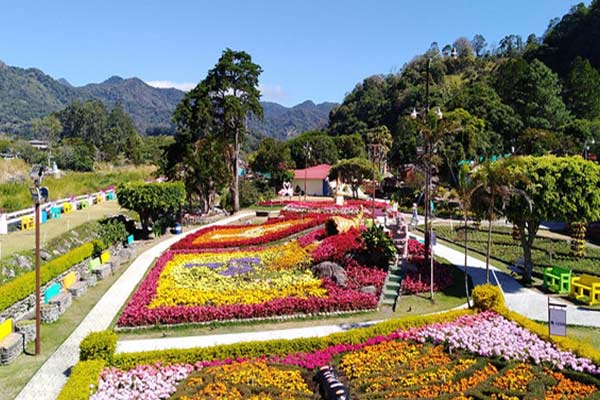
A place of extraordinary beauty, Boquete is the emerald green gem of the Chiriquí province. The sprawling district is known for its flowers, coffee, and fruit. An abundance of fertile land has attracted avid gardeners and farmers. In fact, nearly 80% of the country’s fresh produce hails from the Chiriquí Highlands.
At elevations of 3,000 to 4,000 feet, Boquete’s springlike climate is a major draw, with daytime highs from 70 F to 80 F and evenings about ten degrees cooler. A misty rain known as bajareque keeps everything green and makes it easy to grow just about anything.
In Panama, mountain regions tend to get around 100 inches of rain a year, with most of that falling from August through November. But since Boquete also gets a great deal of sunshine—even when it’s drizzly—it’s also known as the rainbow district.
From the village center you can see the stunning Volcán Barú, Panama’s highest peak. The Caldera River flows through the centro, and there are cool streams and waterfalls throughout the province.
Many of Boquete’s homes are reminiscent of Swiss chalets, a trend that can be traced back to European settlers who came here in the early 1900s. What began as a small farming community is now a lively tourist and expat destination. There is no shortage of things to do, from hiking and horseback riding to bird watching and river rafting. Expats and locals have come together to found a yearly jazz and blues festival, a theater and community center, a single expats club, and more.
Boquete has a lively art scene, a wide variety of restaurants, several golf courses, and it’s only 45 minutes by car from David, Panama’s largest, most convenient city after the cosmopolitan capital.
Panamanians in this region live comfortably alongside the many expats who have retired or relocated here. The community is known for being accepting, inclusive, and family-oriented. If you want to live an active, social, outdoorsy lifestyle, Boquete may well be the perfect choice.
Panama, Panama, Panama: A Cosmopolitan City on the Sea
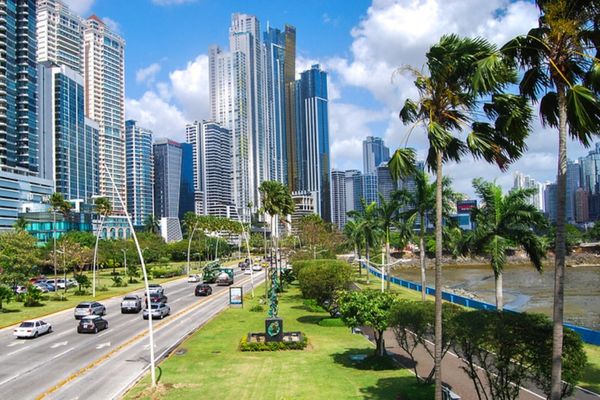
With a shining city center on the Panama Bay, the nation’s capital offers comfortable, cosmopolitan living. It’s completely outside the hurricane belt, warm and sunny, and living here costs a fraction of what you’d pay in good-weather cities in California or Florida.
The city checks all the boxes, which is why I chose it when I left my Miami-based cruise industry job. For over a decade, my local mailing address ended in Panamá, Panamá, Panamá…the city of Panama, in the province of Panama, in the Republic of Panama.
I enjoyed incredible restaurants, nightlife, cultural events, and so much more. The city wasn’t perfect—it never will be—but I had the kind of life I’d seen on TV and in films. In fact, it was better.
Hopping the clean, air-conditioned metro from Albrook Mall to downtown El Cangrejo costs just 35 cents, and is a far more pleasant experience than I’ve ever had in Paris or Manhattan. On arrival, you can walk to any number of restaurants…Indian, Spanish, Vietnamese, Venezuelan, Korean, Italian, and the list goes on…take your pick.
I can’t think of a single important thing you can’t walk to from the city center. There are clinics and pharmacies, wine and foodie shops, multiple banks and ATMs…no car needed. You’ll see people on the street and in the parks late into the evening, enjoying the safe, lively atmosphere. And if you linger over dinner and into the wee hours, never fear—Uber is still cheap and reliable in Panama City.
Head to the waterfront from El Cangrejo and you’ll see gleaming skyscrapers filled with condos, offices, and more. You can walk along the ocean on the Cinta Costera, a network of roads, pedestrian walkways, bike paths, and recreational areas.
In this sector you’ll see just how modern and beautiful Panama City can be. It’s home to an International Banking Center (IBC), a Johns Hopkins International affiliate hospital, and some of the world’s most notable architecture.
At the end of the Cinta, you’ll reach romantic Casco Viejo, a UNESCO World Heritage Site. Step back in time in stately plazas surrounded by beautifully restored colonial buildings. This is a nightlife hub, home to some of the city’s ritziest (and yes, priciest) hotels, restaurants, and residences.
With high-speed internet, reliable power, and potable water, Panama City is a great fit for North American expats who appreciate its strategic location. It’s in the same hemisphere, in the Eastern Standard Time Zone. It’s home to the region’s best and busiest airport, the Hub of the Americas, just a three-hour flight from Miami. It’s on the warm, tropical Pacific…and just a two-hour drive from the Caribbean beaches of Portobelo. I’ve yet to find a city that can beat all that.
Coronado: Panama’s Premier Pacific Beach
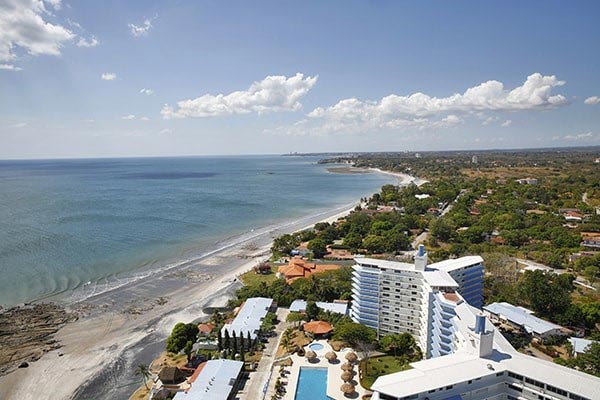
The sound of waves rolling in soothes me as I walk on the warm sand. Bursts of green palm trees ring the beach, which is dotted with bits of driftwood, coral, and shells. There are some boulders on the shore and in the water. A few white marine birds complete the scene…they stand on spindly legs, looking out to sea.
My companions are surprised at how lovely the beach is…how quiet and tranquil. They gasp when we approach our first patch of black sand, glittering like stars underfoot. It took my breath away the first time I saw it, too…suddenly I knew what it felt like to be Lucy in The Sky With Diamonds.
The Coronado beach district is known for sunny weather, uncrowded beaches, and a welcoming community. It’s in the region known as the Arco Seco, or dry arc, as it receives less rain than nearly any other part of the country.
Though it’s on the Pacific, the water here is warm and brightly blue. When it rains, it’s usually just for an hour or two in the afternoon. Temperatures rarely climb above 88 F during the day, and it’s about 10 degrees cooler at night. Ocean breezes help keep things comfortable outdoors, so residents can spend hours gardening, golfing, or dining al fresco.
Whether you stay here all year or snowbird to escape winters up north, you can expect mild, happiness inducing weather.
With outstanding growth over the past five years, Coronado has become this Pacific Coast region’s hub. Where before there was a golf club, a beach club, and not a whole lot else, there are new shopping plazas, grocery stores, restaurants, a multitude of medical services, and more. There’s high-speed internet, cable television, and cellular service for calls and data.I was happily settled in Panama City when an apartment for sale in Coronado, just an hour’s drive west, caught my eye. It had an incredible ocean view, with Campana mountain visible to the east. It was located on a quiet golf course, surrounded by trees, flowers, and other greenery. The building had social and recreational areas on three floors.
There was a vast pool and barbecue area on the ground floor, with smaller pools some 30 floors up. The gym, game room, social area, and party room all had riveting views. I have to live here, I thought. I ended up getting the apartment—just over a thousand square feet—for $155,000.
Coronado is both comfortable and convenient. A place that’s more developed than developing…where big builders aren’t “about to invest” but already all-in with resorts and residential projects already along the surrounding coast.
It isn’t the cheapest place in Panama…most singles and couples budget at least $2,500 for monthly spending, including rent. There are parts of Panama where you can live comfortably on less than $2,000 a month. But Coronado offers a truly high-value lifestyle. When it comes to ease and comfort…it’s hard to beat.
Pedasí: Rural, Beachy, Small-Town Living
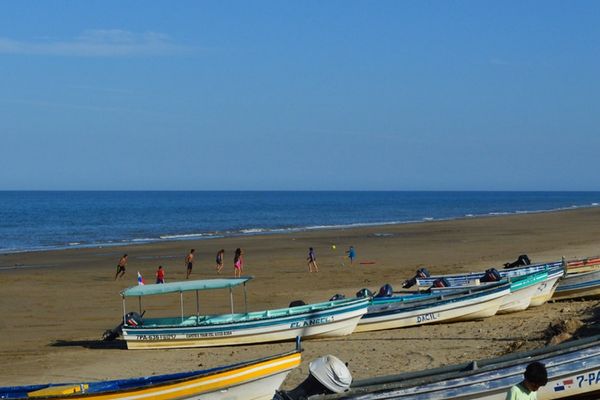
Imagine living along a string of beaches, all with warm waters and pristine surroundings. Some are white-sand beaches, while others are a deep golden brown. The ocean ranges from the clear blue of the sky above to a deep cobalt blue. You can go sport fishing, paddleboarding, surfing, snorkeling, or just splash around and enjoy.
Locals are known for being courteous and welcoming. Most days, however, there are few if any people on the sands, so you have great stretches to yourself. It feels private and exclusive…and yet costs here are laughably low compared to similar destinations in the U.S. If you own your own home, you can live here on $1,000 a month.
Located on the Azuero peninsula on Panama’s Pacific coast, the Pedasi region is a place for ocean lovers, fishing enthusiasts, and more. The center of life here is Pedasi village, lined with neatly painted homes with welcoming terraces.
The closest beach is walking distance, about a mile from the main square. Drive south and you’ll pass a dozen more. They are clean, quiet, and devoid of big name resorts. With its unexplored coastline and world-class fishing, the Pedasi region is brimming with potential.
It has attracted expats from across the globe, including the U.S., Canada, France, and Israel. The main draw? This is one of Panama’s driest regions. Rainfall is as little as 40 inches a year, compared to about 120 inches on the Caribbean coast.
In what’s known as Panama’s heartland, the best ways of life have been preserved. On patios you can see ladies grinding fresh corn for fritters or embroidering traditional dresses known as polleras. Kids spend their days playing outdoors in the fresh air, and parents do not worry—it’s a region filled with safe, small towns.
Plus, the Azuero region is the least expensive in the country. In local surveys, food and property prices always rank lower here than anywhere else in Panama. A couple could live here on $1,200 a month plus rent with no trouble at all.
Life in Pedasi is inexpensive in part because there aren’t a lot of temptations to part you with your cash. After all, it doesn’t cost anything to swim at the beach or take evening strolls or lay in a hammock. People here tend to walk or use the cheap little buses ($2 to $3 from one town to the next) to move about. Lunch and a couple of beers can run you as little as $8.
And yet, despite the lack of “formal entertainment,” people here seem happier than anywhere else I’ve been. There’s an unhurried feel to life in Pedasi. You’ll never see anyone in a suit and tie, and the opera has never been to town. Flip-flops and a smile, however, are welcome at every turn.
Volcán: Panama’s Shangri-La
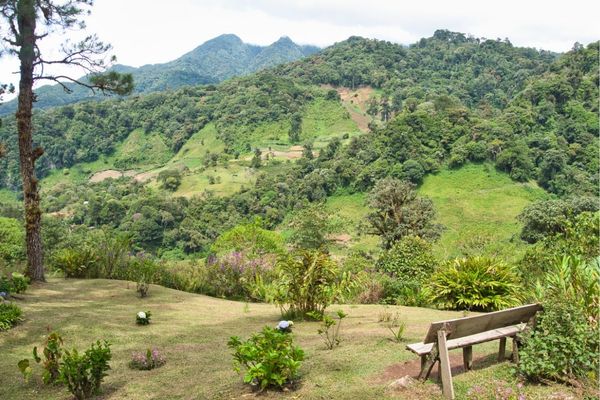
Framed by the Tizingal Mountain to the north and volcanic slopes and plains to the east, Volcán is a dreamy destination that boasts Panama’s coolest weather. The village sits at the foot of the country’s tallest peak, the long slumbering Volcán Barú.
Located in the Chiriquí Highlands, about a 45-minute drive from the convenient hub city of David, Volcán is known for its coffee, orchids, and national park. It is also rumored to confer longevity, with many locals living into their 90s and beyond.
With dramatic mountain scenery and a friendly little expat community, Volcán is one of my favorite places in the entire country.
Amenities here include general and hardware stores, banks and clinics, and several excellent restaurants. You can get high-speed internet, but you won’t be spending much time watching Netflix here. The great outdoors beckon with sunshine, exuberant plant life, and a long list of colorful birds and other creatures, too.
Volcán is one of Panama’s least expensive towns. You can rent a small, local-style home for $350 to $750 a month. Spend a little more and get a lot of luxury. I just saw a big, bright, modern home listed for $1,300 a month, including high-speed internet. The home is furnished, with teak floors, beamed ceilings, and spectacular views typical in this area.
Volcán is similar in many ways to Boquete. Both get about 100 inches of rain a year and though they are cool mountain towns, the lush cloudforest environment means lots of damp. Volcán is less densely populated and a little cooler than Boquete, as it sits at a slightly higher elevation.
If you’d like to live in a safe, small, lush mountain town surrounded by forests, trails, and streams, Volcán may be right for you.
Below are photos of some of the best places to live in Panama.

Get Your Free Panama Report Here:
Learn more about Panama and other countries in our daily postcard e-letter. Simply enter your email address below and we'll send you a FREE REPORT — Panama: Easy, First-World Living and the World's Best Retiree Program.
This special guide covers insider advice on real estate, retirement and more in Panama. It's yours free when you sign up for our IL postcards below.
Related Articles
Living in Panama: Everything You Need to Know
Coronado, Panama: Retiring, Cost of Living and Lifestyle Information
Upcoming Conferences
The Only 2024 Fast Track Panama Conference
If your dream retirement involves stunning beaches… lush green mountains… a warm climate with no hurricanes… first-rate healthcare… incredible value for money (a couple can live well on $2,200 a month)… and the World’s #1 Retiree Discount Program…
Join our Panama experts and expats in February and discover why Panama could be your perfect paradise.

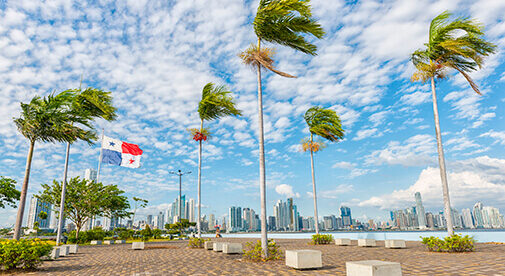
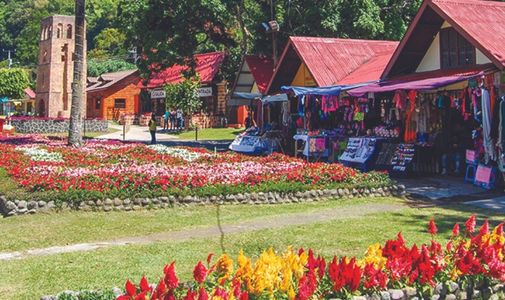
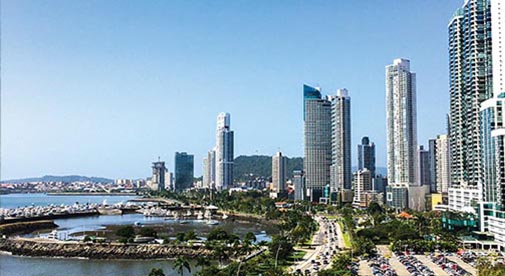
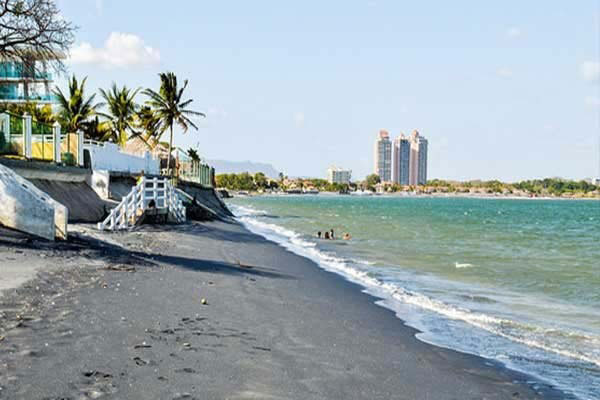
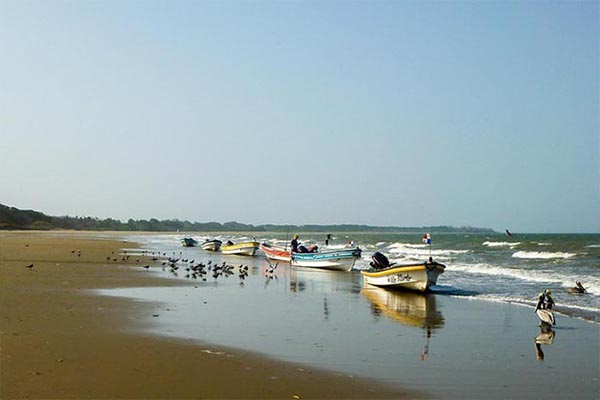
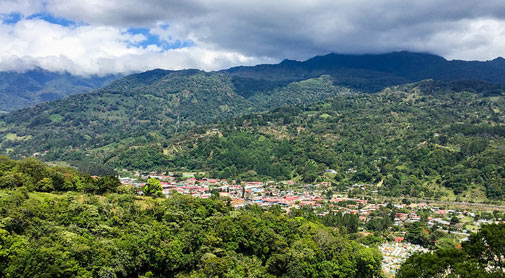

.png)